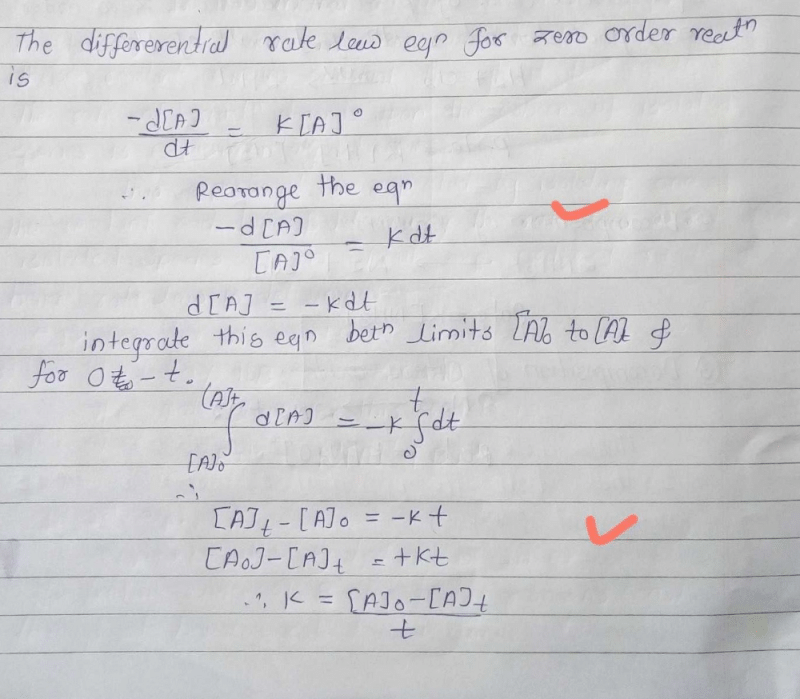Class 12 Exam > Class 12 Questions > Derive an integrated rate equation for the ve...
Start Learning for Free
Derive an integrated rate equation for the velocity constant of a zero order reaction?
Most Upvoted Answer
Derive an integrated rate equation for the velocity constant of a zero...

Community Answer
Derive an integrated rate equation for the velocity constant of a zero...
Integrated Rate Equation for Zero Order Reaction
Zero order reactions are those in which the rate of reaction is independent of the concentration of the reactant. The rate constant for a zero order reaction is defined as the rate of disappearance of the reactant per unit time.
Determination of Rate Constant
The rate constant for a zero order reaction can be determined experimentally by measuring the concentration of the reactant at different times and then plotting a graph of concentration versus time. The slope of this graph gives the rate of disappearance of the reactant. The rate constant (k) is then calculated using the equation:
Integrated Rate Equation
The integrated rate equation for a zero order reaction can be derived as follows:
where [A]t is the concentration of the reactant at time t, [A]0 is the initial concentration of the reactant, and k is the rate constant.
Rearranging the equation, we get:
This equation shows that the rate constant for a zero order reaction can be determined by measuring the concentration of the reactant at different times and then calculating the slope of the graph of concentration versus time.
Conclusion
The integrated rate equation for a zero order reaction can be used to determine the rate constant for the reaction. This equation is based on the fact that the rate of disappearance of the reactant is independent of its concentration. By measuring the concentration of the reactant at different times and then calculating the slope of the graph of concentration versus time, the rate constant can be determined. This equation is useful for understanding the kinetics of zero order reactions and for calculating the rate constant in practical applications.

|
Explore Courses for Class 12 exam
|

|
Similar Class 12 Doubts
Derive an integrated rate equation for the velocity constant of a zero order reaction?
Question Description
Derive an integrated rate equation for the velocity constant of a zero order reaction? for Class 12 2024 is part of Class 12 preparation. The Question and answers have been prepared according to the Class 12 exam syllabus. Information about Derive an integrated rate equation for the velocity constant of a zero order reaction? covers all topics & solutions for Class 12 2024 Exam. Find important definitions, questions, meanings, examples, exercises and tests below for Derive an integrated rate equation for the velocity constant of a zero order reaction?.
Derive an integrated rate equation for the velocity constant of a zero order reaction? for Class 12 2024 is part of Class 12 preparation. The Question and answers have been prepared according to the Class 12 exam syllabus. Information about Derive an integrated rate equation for the velocity constant of a zero order reaction? covers all topics & solutions for Class 12 2024 Exam. Find important definitions, questions, meanings, examples, exercises and tests below for Derive an integrated rate equation for the velocity constant of a zero order reaction?.
Solutions for Derive an integrated rate equation for the velocity constant of a zero order reaction? in English & in Hindi are available as part of our courses for Class 12.
Download more important topics, notes, lectures and mock test series for Class 12 Exam by signing up for free.
Here you can find the meaning of Derive an integrated rate equation for the velocity constant of a zero order reaction? defined & explained in the simplest way possible. Besides giving the explanation of
Derive an integrated rate equation for the velocity constant of a zero order reaction?, a detailed solution for Derive an integrated rate equation for the velocity constant of a zero order reaction? has been provided alongside types of Derive an integrated rate equation for the velocity constant of a zero order reaction? theory, EduRev gives you an
ample number of questions to practice Derive an integrated rate equation for the velocity constant of a zero order reaction? tests, examples and also practice Class 12 tests.

|
Explore Courses for Class 12 exam
|

|
Signup for Free!
Signup to see your scores go up within 7 days! Learn & Practice with 1000+ FREE Notes, Videos & Tests.



















